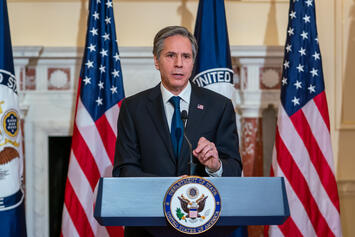
In our short-attention-span world, we seem to only be able to comprehend one war at a time. But our moment has thrown up conflicts across the globe: Israel versus Hamas, Russians versus Ukrainians, or Chinese democrats versus the Communist Party. But these disparate battles are in fact part of one whole – a struggle to dominate the future.
The new wider war includes attempts by great powers, notably China, to secure natural resources by securing alliances with authoritarian regimes around the world. In exchange, China provides goods, including military items, to authoritarian regimes in Latin America, the Middle East, and Africa.
This de-facto alliance, a modern version of the World War Two “pact of steel”, is truly global in scope. It extends from Ukraine to the shutting off of the Red Sea by Yemen’s Houthis, and even Venezuelan plans to conquer much of oil-rich Guyana. Rather than Francis Fukuyama’s end of history, we are seeing Samuel Huntington’s bleak vision in his 2011 book, “The Clash of Civilizations and the Remaking of World Order”.
The wider war pits on one side the revanchist powers – China, Russia, Islamist, Latin American and African countries – who feel they have been wronged by the West and liberal capitalism. On the other side are the West and non-European allies like Japan, South Korea and perhaps most importantly Modi-led India.
The West’s leaders, as in the 1930s, seem more interested in diplomatic maneuvering than confronting a real and present danger. They view the appeasement of Iran as pragmatic, but the creation of a trade deal with Great Britain as marginal. It’s not far from the mark to describe US Secretary of State Anthony Blinken, as Tablet recently did, as “Neville Chamberlain with an iPad.”
The historical parallels are troubling. One has to doubt the West’s resolve not only in the Ukrainian and Israel-Hamas hot wars, but also in future conflicts: watch the US Navy respond to the Houthi attempts to shut down Red Sea shipping with meager half-measures. I shudder to think how pusillanimous the likely response to a potential future Chinese invasion of Taiwan, or further Russian steps to recover other parts of its lost empire, may be.
Winning the wider war depends on three things – a strong industrial base, military preparedness, and internal morale. Right now, the West seems determined to weaken its manufacturing industries, for example through electric vehicle mandates which will help Beijing. The Middle Kingdom retains an almost monopoly position on the EV battery supply chain – 80 per cent of the world’s raw material refining, 77 per cent of the world’s cell capacity and 60 per cent of the world’s component manufacturing. They produce more than four times the batteries as the United States, and control critical raw materials required for manufacture. China is also cultivating emerging vassal states in Africa and Central Asia as well as Latin America to meet their resource demand.
Read the rest of this piece at Telegraph.
Joel Kotkin is the author of The Coming of Neo-Feudalism: A Warning to the Global Middle Class. He is the Roger Hobbs Presidential Fellow in Urban Futures at Chapman University and Executive Director for Urban Reform Institute. Learn more at joelkotkin.com and follow him on Twitter @joelkotkin.
Photo: Secretary of State Antony J. Blinken, GPA Archive via Flickr in Public domain.












